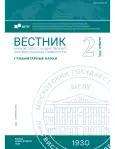The Logic of Time Intervals Designation in French: huit jours, quinze jours, vingt jours
- Autores: Pylakina V.V.1
-
Afiliações:
- Moscow State Linguistic University
- Edição: Nº 2(896) (2025)
- Páginas: 52-58
- Seção: Linguistics
- URL: https://journal-vniispk.ru/2542-2197/article/view/283963
- ID: 283963
Citar
Resumo
The present study is devoted to the problem of the designation of time intervals in the French language in a diachronic aspect. The purpose of the study was to identify the reasons why the designation of time periods in French has no single basis. This problem has been known for a long time: at first glance, the following designations completely lack the logic: huit jours (eight days) − week, quinze jours (fifteen days) − two weeks, vingt jours (twenty days) − three weeks. However, upon closer examination, it turns out that the time periods in question were named in different periods and in accordance with different number systems adopted by different peoples, which had their influence on the formation of the French language.
Palavras-chave
Sobre autores
Veronika Pylakina
Moscow State Linguistic University
Autor responsável pela correspondência
Email: veronikap2002@mail.ru
PhD (Philology), Associate Professor, Associate Professor at the Department of the French Language
RússiaBibliografia
- Burnaceva, Z. K., Pylakina, V. V. (2013). Fundamentals of the theory of a second foreign language: French (p. I). Textbook for fourth year students. Moscow: Moscow State Linguistic University. (In Russ.)
- Pylakina, V. V. (2018). Borrowings from Arabic into modern French. Vestnik of Moscow State Linguistic University. Humanities, 5(795), 116–126. (In Russ.)
- Pline L’Ancien. (1962). Histoire Naturelle (t. XVI). Paris: Les Belles Lettres.
- Dottin, G. (2004). La langue gauloise. Genève: Arbre d’or.
- Pylakina, V. V. (2023). The Potential Influence of the Basque Language on the Formation of Specific Lexico-Grammatical Phenomena in French. Vestnik of Moscow State Linguistic University. Humanities, 4(872), 97–103. (In Russ.)
- Manfred, A. Z. et al. (1972). Istorija Francii = History of France (vol. 1): in 3 vols. Moscow: Nauka. (In Russ.)
- Julaud, J.-J. (2004). L’Histoire de France pour les nuls. Paris: Éditions générales First.
- Méric, M. (1996). Mon histoire de France. Hachette.
- Pruner-Bey, M. (1867). Sur la langue Euscara, parlée par les Basques. In Bulletins et Mémoires de la Société d’Antropologie de Paris, 2 (t. 2, pp. 39−71).
Arquivos suplementares










